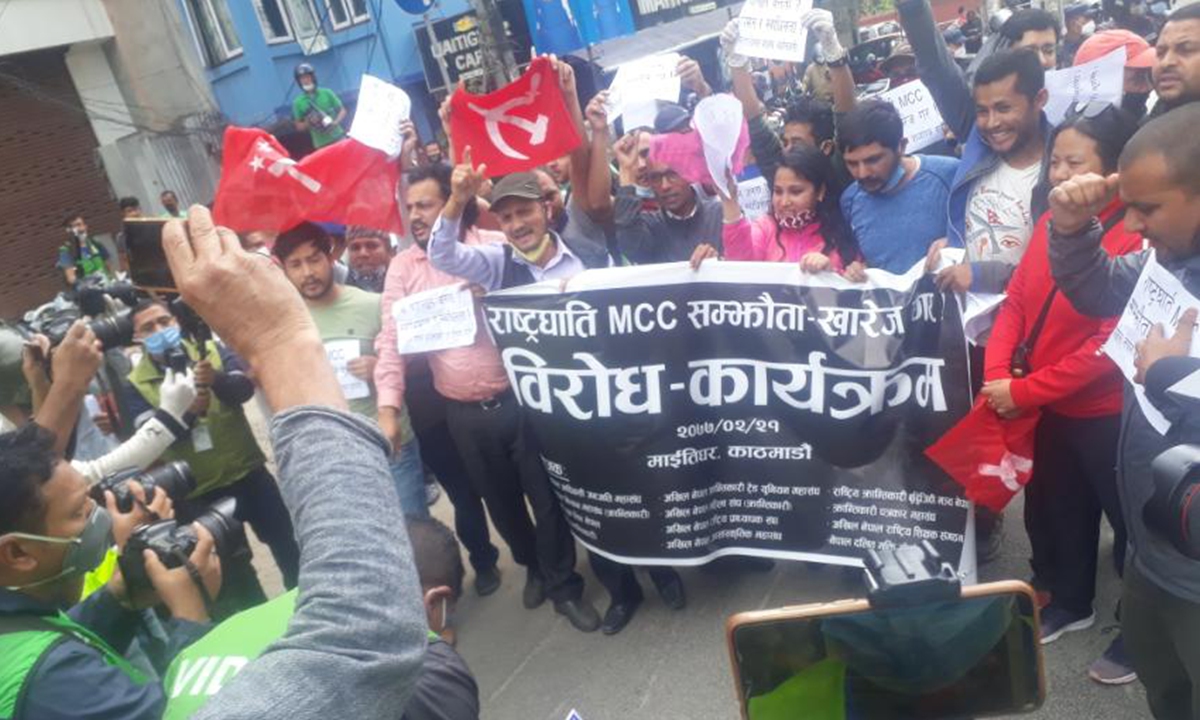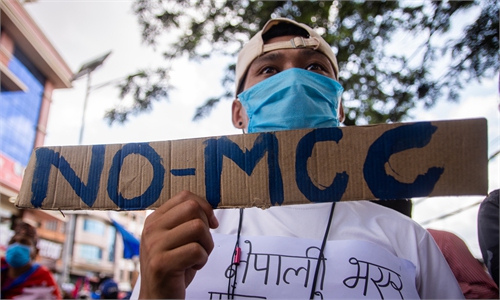IN-DEPTH / IN-DEPTH
US tries in vain to exclude China’s BRI projects from international cooperation

Nepalese protest against the MCC in Kathmandu on June 3. Photo: Courtesy of a local observer
As US aid program agency Millennium Challenge Corporation (MCC) has developed its partnership with many underdeveloped countries where China-proposed Belt and Road Initiative (BRI) programs have been established, some have speculated the US economic package is increasingly a part of Washington's countermeasures against the BRI.Chinese engineering contractors have participated in MCC projects in Africa before 2010. But since September 2010, the US has changed its rules to exclude Chinese state-owned enterprises (SOEs) from bidding for MCC foreign aid projects, which observers said was partly a result of broken trust between the two countries amid soured diplomatic relations.
US hostility and anxiety to China and Chinese SOEs loom over aid projects around the world as competition and conflicts have hastened in recent years.
MCC partnerships now require more stringent standards of scrutiny over national security, especially in technological-sensitive industries, as it claims the US is afraid of China's infringement of US intellectual property rights and technologies.
But the BRI follows very different principles from the MCC because the BRI focuses more on economic cooperation in the host countries, Zhou Zhanggui, a researcher of non-traditional security and peaceful development from Zhejiang University, told the Global Times on Monday. "China does not set up political obstacles, but requires all countries to abide by the bottom line of equality, mutual benefit and non-interference," he said.
In contrast, the MCC has three indicators that explicitly measure a country's commitment to democratic principles - political rights, civil liberties and freedom of information. In addition, MCC's "Ruling Justly" category measures rule of law, government effectiveness and control of corruption. Good performance in these areas is critical to passing MCC's scorecard and receiving assistance.
Supplemental information used by the MCC for selecting partnerships also includes reports like the US Department of State's Human Rights Report and the Trafficking in Persons Report. Experts warned reports cited by the MCC may draw biased conclusions if their groundless accusations and assessments of human rights issues in China's Xinjiang and Tibet regions are any indication.
"US money is flowing in, not for development, but for instability, anarchy, corruption and the means to divide China. The US is conspiring to keep China from Nepal by passing the MCC. Although US activity in Nepal appears to be low due to the coronavirus pandemic, the influx of Americans into Nepal since 2018, and the increased activity in the government and nongovernment sectors reinforces fears that it could pose a serious threat to peace and stability in the region," Prem Sagar, president of Kathmandu-based Nepal-China Mutual Co-operation Society, told the Global Times.
Alice G. Wells, US Principal Deputy Assistant Secretary in charge of South and Central Asian Affairs, said on May 20 that the US hopes Nepal will accept the $500 million loan from the MCC program, suggesting only Nepal's acceptance would prove it does not answer to China.
"The US practice of distorting and slandering the mutually beneficial cooperation between China and South Asian countries has once again laid bare its arrogance, prejudice, selfishness and narrow-mindedness," Chinese Foreign Ministry Spokesperson Zhao Lijian said in a response, stressing that China has all along aimed to help relevant countries enhance their capabilities for self-reliant development without imposing China's will or attaching political strings.


